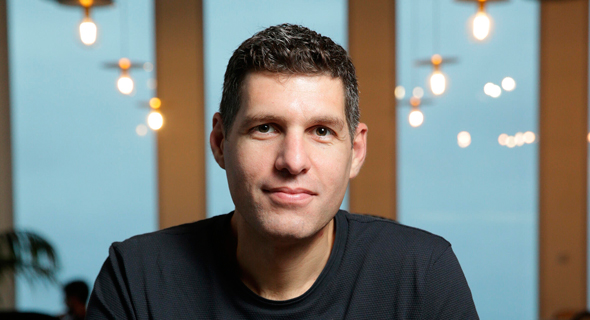Yaron Zinger walked away from Harvard tenure to protect AI from its own mistakes.
By Sophie Shulman, CTech
Like so many other companies, Robust Intelligence has its regular end of the week rituals. Only that unlike Israeli TV satire “Hightechs” – they don’t have happy hours or other treats. “Every Friday we have a military-style inspection — we clean the toilets, tables and the entire office by ourselves,” Yaron Zinger, the start-up’s Israeli founder, told Calcalist in his first ever interview during a home visit to Israel.
“On weekday mornings, we also do group workouts in which everyone jogs their own distance. And when we have a company event – it is camping.
“All 50 of the company’s employees are American and they’re crazy about all this stuff I bring from my military service.”
What end does this serve?
“Things like group workouts or inspections create a unique interaction among the workers that is not based solely on coding. All that stuff that is a group effort, and not purely professional work — to me that’s what forges a deeper connection between people. I think it manifests in the work itself: if we know how to keep the office clean and organized, then our code will also be clean of bugs. Discipline is universal and is not limited to any certain level.”
Do the employees cooperate?
“It’s probably a chicken and egg thing – we bring in people who already have a connection to that culture. A large part of our sales team are people who were on the rowing teams of the universities they attended, because I’m a great believer in that sport. One of the first employees at the company was on the Harvard rowing team with the Winklevoss twins (Taylor and Cameron, who fell out with Mark Zuckerberg over the founding of Facebook). It’s a competitive and Sisyphean sport, which makes the people who love it a good fit for sales – them and musicians, who are also used to long hours of practice to hone their technique, and know that results take time.”
Singer himself wasn’t able to get into the Harvard rowing team, and from early on in life channeled his need for challenges into rock climbing. “I like when things are difficult and unclear. And that is essentially what startups are about.”
From Special Ops to Harvard
You have to really love what you do in order to undertake a journey like Singer (42), who started off as an officer in a special ops unit, proceeded to a career as a brilliant mathematician at Harvard — becoming at 33 one of the youngest faculty professors, and by 40 achieving academic tenure — and went on to found a cutting-edge start-up company.
Robust Intelligence seeks to protect artificial intelligence (AI) from itself: however sophisticated, AI can still make mistakes, some with far-reaching implications. Robust‘s product is designed to detect these failures so they may be fixed. The company’s technology actually provides the AI industry – currently at the forefront of technology – with advanced security and enhancement tools. Singer’s research is so groundbreaking in this technological niche that the way Robust is creating a new market for AI products is reminiscent of how Gil Shwed and Check Point’s firewall gave birth to the cyber market.
A telltale sign of the company’s potential was its second financing round completed last month in which Robust, headed by Singer, raised a whopping $30 million from Tiger Global and Sequoia – two of the world’s largest investment funds, as well as the fact that the company’s AI firewall is already on the market, registering tens of millions of dollars in sales to dozens of customers.
Singer served in the IDF in a special ops unit, and upon finishing his service pursued mathematics and computer studies at Tel Aviv University. His talent was obvious, and by 2007, after completing his undergraduate studies, he was on his way to Berkeley for his PhD in computer science, with a focus on algorithms with limited information.
But mathematical equations were not enough to satisfy his hunger for excitement. So Singer decided to take a break from his studies and to found Bidwave – a startup that sought to develop a technology for identifying social media influencers. “We had been working on it for a year and could have sold it to Facebook and be on our way, but I didn’t understand Facebook’s potential at the time. That was before its IPO and I didn’t perceive it as a $100 billion company or think they’d get very far. So selling meant giving up my dream, and the trade-off in terms of money didn’t feel right.”
So Singer did an about-face and returned to university. “My supervisor was livid about the start-up thing, but it was the first time since the army that I really felt like I was in my element. I enjoyed it, and when I completed my PhD, I had to figure out what I’m going to do next”. So he turned to Harvard and Stanford in search of a job.
The idea of working at Stanford was born while working for two of the school’s alumni, Larry Page and Sergey Brin.
“In 2007, Peter Norvog, head of research and artificial intelligence at Google and one of the founding fathers of the AI industry, gave a talk to doctoral students at Berkeley about Google Translate, which was then in its initial stages of development. He explained that despite the perceived complexity of AI, most of its problems can be solved by simple algorithms. That piqued my curiosity, so I joined Google, on a special “loan” so to speak. I got there in 2011 for a two-year term, and was on a team that researched machine learning. We were a four-person team then; today the division has thousands of employees.”
Singer completed his PhD, and was accepted into Harvard in 2013. “Secretly, I’ve always dreamed of a start-up company, but when you get accepted into Harvard, you don’t say no. I was always very focused on comprehensive research, but at the same time I knew that we would eventually start a company,” he says, referring to his student and co-founder of Robust, Japanese Kojin Oshiba.
Keep On Running Even When You’re At the Top
Singer leads a company that has already raised nearly $50 million from major players in the investment field, and unlike other start-ups at this stage it is already selling its technology, generating tens of millions of dollars.
“The topic I have researched is indeed important and groundbreaking in the area of computational complexity. I checked whether all algorithms had the same computational capabilities, and found that they did not. I wanted to prove mathematically that there are things in AI which just don’t work, and to identify the limitations of computational complexity. I wanted to look directly into the eyes of machine learning and prove that there are instances where it doesn’t work.
“At first, I was met with more than a bit of criticism and resistance from within the industry and the academic ranks. Despite all the mathematical evidence I presented, many still argued that what we claim was impossible. I gave dozens of talks on how sensitive this area is, and I uncovered the inconvenient truth about AI. There’s a real fundamental problem here, and yet everyone said it can’t be right.”
True to his cause, Singer continued with his research and published numerous papers, until the experts were convinced – even in academia. In 2018, even before he hit 40, he became one of the youngest professors at Harvard University and at record speed was granted academic tenure.
So, you reach the pinnacle of academic recognition – a point at which most people slow down and enjoy their accomplishment – and start a new race, take unpaid leave from Harvard and found a start-up.
“One of my favorite songs is Neil Young’s ‘Hey, Hey, My, My’, in which he says ‘It’s better to burn out than to fade away’. In the face of the rising punk movement, Young started to believe that he and his music were a thing of the past. He released this song as a kind of farewell, but surprisingly, it not only launched his career into a new phase but actually laid the foundation for grunge music. This regeneration is what drives me.”
When AI Doesn’t Realize It’s Making a Mistake
This hunger bred Robust Intelligence, which was founded in the summer of 2019 in California (which led to the relocation of the Singer family, with two children ages 9 and 6, from the East Coast to the West Coast). The company was based on Singer’s groundbreaking studies and the way they mapped the errors inherent in artificial intelligence. But the obvious question was how to make money off the snags of computational complexity.
The answer was clear: find a way to fix them. Entire industries are now expanding their reliance on AI; industries such as finance and insurance, in which the smallest mistake by the machine can translate into huge losses.
Could you give me an example of what kind of AI failure can translate into big losses?
“Take, for example, an AI system that determines the chances of a policy-holder getting sick in the coming year and accordingly sets the cost of their insurance policy. One of the crucial parameters here is age. An AI system works properly and correctly, but let’s say there’s a small mistake in the data so that instead of age, the year of birth is entered – for instance, instead of 36, it says 1985. Without a firewall alerting that there’s an error, the system thinks the candidate is 1,985 years old.
“Or systems in the financial world that are supposed to determine whether a money transfer is legitimate or illegal, but might get confused because of the difference between lower- and upper-case letters.”
These are things a human being would identify, but AI cannot.
“Exactly. That’s why all AI systems have failures, it’s built into the algorithms. And it’s hard to imagine that within five years there will still be companies that won’t be making use of AI, so they’re all going to need a firewall for these systems – and at present, we’re the only ones who are making them. Knowing that such systems are being used without any protective measures is very frightening, so our mission is to reduce the risks that companies take on when they install AI systems. We save them a lot of time and money, and more importantly – protect people from wrong decisions that may result from artificial intelligence errors.”
A recent case in point of the economic significance is U.S. real estate company Zillow. Two months ago, the company announced that it was closing its expedited home purchase and sale division because a critical error was found in the AI model that priced the houses, sending the company’s stock into a 50% plummet.
“Zillow invested a fortune in its AI home pricing system, that had critical mistakes, because the models were based on data collected prior to the Covid-19 outbreak yet applied to data collected during the coronavirus period,” Singer explains. “Our firewall could have detected the failure in advance, because the software can identify whether the statistical distribution makes sense or not.”
Meaning that you have a tool that not only identifies basic data errors stemming from parameter discrepancies, but also knows how to say “this doesn’t make sense”?
“Yes. For example, a sensible distribution of airfare would be between $100 and $2,000 per ticket, but if the price is quoted in Japanese yen the values are completely different, and the software would take notice. Similarly, a parameter of how long a house is on the market has a reasonable distribution; pre-COVID in most areas of the United States, the average time was something like a week, and if a property did not sell in that period, its price would most likely fall. During the COVID pandemic, houses were on the market longer, and this should have been reflected in the pricing model, but it did not because the model didn’t pick up on it.”
One may assume that you are not one of those who fear the rise of the machines – an era in which AI will take over our lives like the horror scenarios we read about in sci-fi books?
“An artificial intelligence system is a tool that the world adopts, because it vastly contributes to productivity and provides a leap forward in automation. The best analogy I can give in this context is vehicles — they’re not intrinsically good or bad, they play important roles, they serve us in a multitude of ways, but vehicles in people’s hands sometimes kill. We put on seat belts and try to make as much progress as possible in accident prevention.”
Single-handedly Creating a New Market
If, within five years, all technology companies are expected to use artificial intelligence on some scale, you can understand the enthusiasm among the funds towards Robust. According to recent forecasts, global investment in AI systems will double in two years, from $50 billion in the past year to $110 billion by 2024, led mainly by the banking and retail industries. These are the companies Robust is targeting, and it is actually single-handedly inventing a new market.
“Our sales method is pretty effective,” Singer boasts. “What I also love about start-ups is the creativity – no one in the world is currently selling AI firewalls, so there’s no rule book. In that sense, too, I’m like Gil Shwed, who already in the ’90s sold firewalls. We developed our own unique sales process. In most companies, the sales process is done in person and is drawn-out, lasting up to six months and sometimes even a year. For us, it’s much faster — we send out emails to companies we’ve never met, show them their system’s failures, and within three or four weeks they become our customers.”
Bring Joy to Israeli Soldiers - Send Winter Care Packages!
We are honored to thank the young men and women of the IDF who risk their lives every day to defend the citizens of Israel.
Join us in sending winter care packages and personal notes of support to Israeli soldiers who are out in the cold all day.
Warm up a soldier's heart with essential winter wear including fleece jackets, hats, gloves and more. Keep an entire unit warm!
THE SOLDIERS REALLY APPRECIATE YOUR LOVE AND CONCERN!
Click Here to Send Your Gift and Personal Note to Israeli Soldiers


